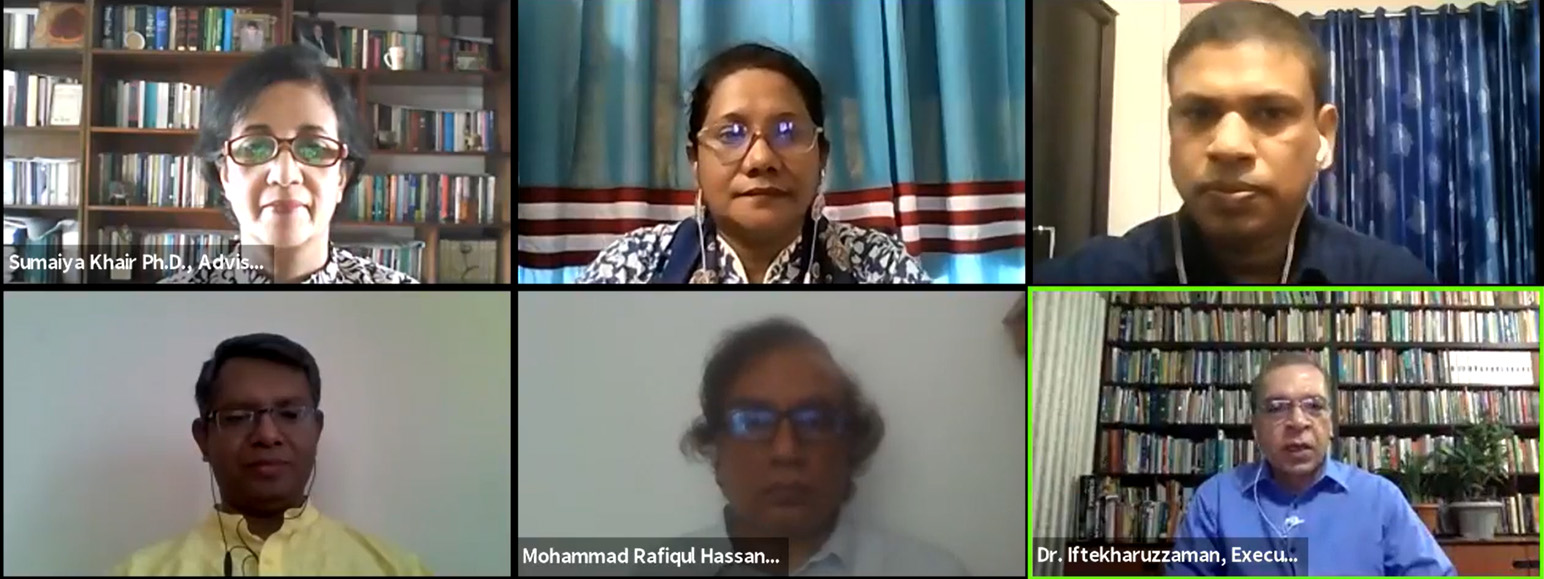Published: 29 September 2020

The 11th Jatiyo Sangshad (National Assembly) has failed to function as expected in terms of legislation, representation of the people, and ensuring government accountability, said the flagship TIB study Parliament Watch (PW). The study was presented to the media through a virtual press conference on September 30, 2020.
The latest Parliament Watch (PW), first of its kind on the 11th national assembly and the 16 th of the Parliament Watch (PW) series since 2001 by TIB, also identified some challenges, including gaps in the parliamentary openness, deficits in playing a vital role by the opposition party and the Speaker, and inadequate information disclosure.
The expected role of the 11thparliament, which formally commenced in early 2019 after a questionable national election, was extensively constrained by many shortfalls, mainly due to the increased exercise of monopoly power in parliamentary activities by the ruling party. Also, the inactive role of the opposition party due to its contradictory position, fewer legislative discussions and poor performance of the Members of the Parliament (MPs) and standing committees in holding the government accountable contributed to the poor performance of the Parliament.
PW covered the 1st to 5 th sessions of the 11 th Parliament, analysed the roles and proceedings of all the sessions in ensuring democracy and good governance, and offered recommendations for making the Parliament effective. The report summed up the observations examining the activities of the parliamentary standing committee including various sessions, President’s Speech, roles of MPs in ensuring people’s representation, enacting laws, making the government accountable, assessing the role of Speaker and engaging the MPs in the management of parliament, sustainable development goals, gender perspective etc.
According to the report, among the Members of Parliament (MPs), 61% of them are businessmen, 13% are lawyers, 5% of them are politicians, and other 21% of them are from different professions (teachers, doctors, farmers, retired government and military officers, homemakers, consultants, etc.).
The report found that most of the time of the Assembly was spent on activities related to establishing public representativeness and accountability (31%). In comparison, only 9% of the time was spent on the legislation process (without budget). Although the main opposition party and other opposition members were found relatively active in proposing amendments and scrutiny of the bill, the treasury bench members spent only 16% (the ministers who introduced the bill) time out of the total law enacting times.
Also, people’s participation in enacting laws could not be ensured adequately as all requests for seeking public opinion on proposed bills were rejected by voice vote as practised earlier. Similarly, views and proposals floated by opposition members in law-making processes were also dismissed.
The report also observed that only 51 out of 737 notices (7%) were adopted for discussions during the five sessions. Among these, the highest numbers of notices (53) were related to the Ministry of Local Government, Rural Development and Co-operatives. A significant number of members expressed their displeasure over the lack of opportunity to discuss various critical contemporary issues of the country. Furthermore, the total time lost due to the quorum crisis is estimated to be 19 hours and 26 minutes – which was 17.3% of the time spent. The monetary value for the entire time of the quorum crisis is estimated to be Tk 22 crore 8 lakh 63 thousand and 627.
The report identified a lack of skills and preparations among some of the MPs in presenting the statements and opinions, especially in enacting laws. The treasury bench has maintained monopoly control over the passage of the bill.
PW also identified several un-parliamentary manners, abusive words towards some civil society members and opposition parties, and disorders in the house violating the Rules of Procedure. However, the Speaker of the house did not take adequate measures to maintain order in the gallery and rarely issued a ruling to expunge the abusive comments.

Speaking about the opposition party, Dr. Zaman said, “The absence of an effective opposition party has been systematically confirmed in the current parliament. As a result, an effective opposition party that is crucial for effective parliament is missing. Unfortunately, a culture of questionable and controversial elections has been established. The possibility of a change of power through free and fair elections has been ruled out, the effect of which we can see in the parliament.”
“Thus, the absolute majority of one party in the Eleventh National Assembly and the exclusive opportunity of one party in the parliamentary activities have gained institutional form. As a result, we do not see the expected role of parliament in all of its fundamental responsibilities: legislation, law reform, public representation, and government accountability,” he added.
To make the Parliament more effective, PW placed 12-points recommendations stating that national parliamentary elections must be participatory, fair and neutral in the real sense to make the Parliament effective. In addition, Parliament should operate in a manner that ensures active participation of the opposition party in the parliamentary process, reads the report.







